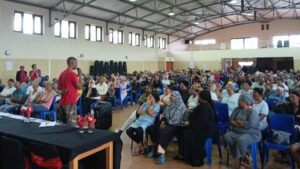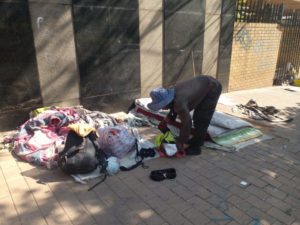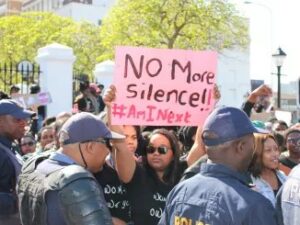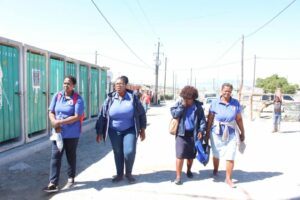South Africa has an extreme shortage of qualified medical doctors with one doctor for every 2,000 patients, said the Eastern Cape chairperson of the South African Medical Association Trade Union (Samatu), Dr Mpumelelo Melamane. Melamane led dozens of unemployed Eastern Cape doctors in a protest march to handover a memorandum of demands to the office of the Eastern Cape Premier Oscar Mabuyane in Bhisho. The union also held marches in Pretoria and Pietermaritzburg.
The country has about 29,000 qualified doctors, responsible for a population of 60-million and only 60% of that number serves in a public healthcare under severe strain, according to Melamane. “In that 29,000, about 40% of them work in the private sector and that means the 60% in the public sector is responsible for a huge population of the country that is without medical aid and cannot afford private healthcare. This means a doctor who is on duty in a public hospital sometimes won’t even be able to take lunch because there are long queues of patients,” he said.
A recent report by Ritshidze, the research initiative led by the Treatment Action Campaign, revealed that staff shortages, staff attitudes, extended waiting times and medicine stockouts are crippling health services in the province.
A doctor who is currently unemployed after completing community service said it has been a setback to find himself without an income and having monthly debit orders lapse. He said: “When you start doing your internship you get paid and you buy stuff because you do not foresee that at the end of your internship you’ll be unemployed, and now you find yourself struggling to make payments and policies are lapsing. In the poor provinces like Eastern Cape, once you start working you start looking after family members; we buy properties or build homes… You find yourself becoming the only person who has an income to support all the family.”
Another doctor who is completing her community service, Siyasanga Thwathwa said she doesn’t know what the future holds when she completes her community service at the end of March this year because a group of doctors that finished in December is currently unemployed. She said those who have been funded by the Eastern Cape department of health have found that the province won’t give them jobs and won’t release them from the contracts they signed to commit themselves to serve within the province after graduating.
Despite the shortage of doctors throughout the province, she added, the department of health always complains about scarcity of funds. “We are currently overworked because you’d find that there’s about five of us in that hospital with hundreds of patients to look after. Our work demands a lot of diligence and peoples’ illnesses are not the same. We also get tired like other human beings but when things go wrong we get sued,” said Thwathwa.
Samatu’s national treasurer, Dr Bruce Marumane, who took part in the Eastern Cape protest, said the province has got one of the lowest doctor-patient ratios. He also said that the shortage of doctors contributes to the high number of medico-legal claims against the province: “The province has a huge shortage of healthcare workers but they are not hiring. It has got a large number of lawsuits arising from childbirths because there’s a shortage of medical professionals that are supposed to deliver babies.”
Cosatu’s Eastern Cape secretary, Mkhawuleli Maleki also linked the high number of legal claims against the province’s healthcare system to overworked staff, saying that this cost would be reduced if more doctors are employed.
Marumane said the health department has got too many managers when they should be recruiting more healthcare workers, doctors and nurses. “There are so many managers that you find there are clashes of roles. Sometimes you ask someone what their role is and they will tell you to ask their boss and we need to change that if we are going to correct challenges of the healthcare system,” he said.
The doctors’ union says that medico-legal claims faced by the Eastern Cape health department are a result of not employing enough doctors.
A memorandum containing their grievances was presented to the office of the premier, but Mabuyane who was not present delegated Buffalo City Metro Mayor Xola Pakati to receive the memorandum.
Among the issues raised in the memorandum is the government’s failure to address the critical shortage of doctors in the public health system while worsening the situation with corruption and mismanagement of funds. Government is urged to ensure adequate staffing to meet the healthcare needs of communities and has been given two weeks to respond to all the issues raised in the memorandum.
But the head of the Eastern Cape health department, Dr Rolene Wagner said the budget for medical students who are provincial bursary holders and currently completing their community service work has been allocated, but that there won’t be automatic absorption. She said: “We have been given a clear directive by the DPSA [Department of Public Services and Administration] that there has to be a competitive process.
In this context, we have a block of adverts for doctors and we utilise that block to make contact with doctors and bursary holders that are exiting the system. We make them aware of our needs and proposed allocations and check if they are interested in coming and working for us.”
The recruitment process has been devolved to districts and has taken longer than anticipated because of challenges in each district to identify vacant posts at particular hospitals. Wagner said the process has gained momentum and she’s getting regular updates with regards to its progress.





